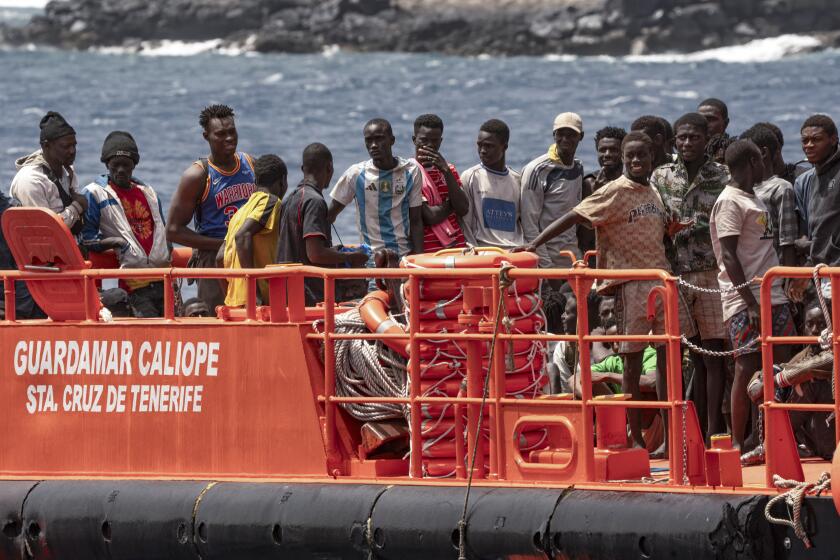Ultra-Orthodox Jews protest jailing parents who refuse school’s desegregation
Tens of thousands of ultra-Orthodox Jews protested Thursday against a Supreme Court decision to jail parents who have refused to comply with its order to desegregate a religious girls school.
Dressed in black hats and carrying posters denouncing the court as “fascists,” the mostly peaceful demonstrators continued their afternoon protest until about 40 parents turned themselves in to police to begin serving two-week sentences for contempt of court, a police spokesman said.
The protests, which organizers vowed would continue, marked the latest fissure in relations between Israel’s religious and secular communities.
The case also has underscored the lingering tensions and prejudices within Israel’s ultra-Orthodox community, particularly between Ashkenazi and Sephardic groups.
The case revolves around the Beit Yaakov girls school in the ultra-Orthodox West Bank settlement of Emanuel. The state-funded independent school enrolls all students, but maintains separate studies that largely keep Ashkenazi students, of European descent, apart from Sephardic, mostly of Middle Eastern and Mediterranean background.
Complaints about discrimination committed by devoutly religious Ashkenazis are not new. Shas, a Sephardic political movement, was formed in the 1980s largely as a response to perceived bias against and marginalization of Sephardic Jews.
But parents of the Ashkenazi girls insist that the separation at their elementary school is based on religion, not skin color, saying Sephardic customs are generally less stringent as regards dress and conduct, such as watching television or using the Internet. Many Ashkenazi ultra-Orthodox reject outside culture and don’t have televisions in their homes.
In defending the separation policy, Ashkenazi leaders denied that ethnicity played a role in the school’s decision.
“There is not a drop of racism,” Deputy Health Minister Rabbi Yaakov Litzman, a leader in the ultra-Orthodox party United Torah Judaism, told Israel Radio. “The problem is that the communities adhere to different standards.”
Not so, according to Yonatan Danino, spokesman for the nonprofit organization that petitioned the Supreme Court to overturn the policy.
“Sephardic Jewry is no less pious and the girls of these families suffered clear discrimination,” he said.
The court agreed, ruling last year that the practice was based on discrimination. Comparing the case to desegregation efforts in the American South in the 1950s, the court ordered the separation at the school to end.
But parents to date have refused to comply, withholding their daughters from school and saying their religious convictions trump the court order. The dispute culminated in a courtroom standoff this week, during which justices ordered 86 parents to either abide by their order or go to jail.
Among them are even a few Sephardic parents whose daughters were allowed to study in the Ashkenazi track after accepting its stricter code. One of them, Meir Elmaliach, father of seven, said Thursday on Israel Radio that he would go “to jail proudly, with my head up high.”
The protests come amid a recent flare-up of tensions between Israel’s secular and religious citizens. This week in a separate decision, the Supreme Court ruled that special government subsidies given to support religious students must end next year because they discriminate against nonreligious students.
Also, violence has rocked the cities of Jaffa and Ashkelon in recent weeks as ultra-Orthodox Jews have protested development projects that they say would disturb ancient graves.
In December, Israel’s defense minister clashed publicly with a high-profile rabbi who was encouraging soldiers to disobey military orders to remove Jewish settlers from West Bank outposts.
Many see the parents’ defiance as a key test of the Supreme Court and Israel’s commitment to rule of law. Retired Deputy Supreme Court President Mishael Cheshin called the case a “test of democracy.” Opposition leader Tzipi Livni said flouting a Supreme Court order put Israel “one minute before anarchy.”
Because of the growing number and political clout of the ultra-Orthodox, a succession of Israeli governments have been reluctant to tackle thorny issues involving the community and have continued to subsidize their lifestyles, even when doing so runs counter to government interests, some experts said.
“Netanyahu is dependent upon the haredi [ultra-Orthodox] politicians and he can’t divorce himself now,” said Menachem Friedman, a Bar-Ilan University sociology professor who studies the ultra-Orthodox community. “He will have to decide whether to surrender to the haredim or [enforce] the Supreme Court decision.”
Sobelman is a Times staff writer.
More to Read
Sign up for Essential California
The most important California stories and recommendations in your inbox every morning.
You may occasionally receive promotional content from the Los Angeles Times.










